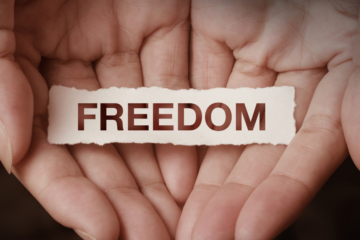By Janet Keefe

A perspective of John 4:4-42
It was midday when she left the house, and it was oppressively hot outside. The sun was high, and was blazingly bright; the heat scorched the ground and she felt it radiating on her skin. Although the temperature was blistering, everyone else would be hiding from the midday sun, and she wouldn’t have to deal with them. She preferred the brutal heat to the judging glances and the hushed voices as she walked through the town. By leaving the house now, she felt she might be almost invisible, less apt to be judged.
Her plan was to go to the well, get water, and get back home. Unfortunately, today, there was a man sitting at the well. “Here comes more judgment,” she thought, as she straightened her tunic and head covering, hoping he would think she was only another modest, upstanding woman of Sychar who just got a late start doing her chores. Internally she felt defiant. After all, this guy was just some stranger, what business was it of his if she was drawing water at noon? Maybe if she acted like he didn’t exist, he wouldn’t pay much attention to her.
Nope. He saw her. AND he wanted a drink. And he was JEWISH. “Here we go,” she thought. “First it’s gonna be, “you lousy Samaritan”. Then it’s gonna be “why are you out here at noon drawing water, when most women draw their water in the morning, when it is cooler?” Next will come the judgment, which always left her feeling guilty and ashamed. Actually, shame and a sense of worthlessness were her only constant companions in life. Even before her first marriage she had felt that she was worthless. Again and again, she had tried to find someone who would love her and see her worth, yet it always ended in guilt and shame. She didn’t want to hear how wrong she was. She wanted to be left alone! She lashed out at the man, her voice dripping in sarcasm. “Puh-lease, you want ME to give you a drink? I’m a Samaritan and a woman. You are a Jewish man”.
He said something strange. It didn’t even make sense. He said something about him being “living water” and that she should be asking him for a drink. She retorted “You think you are better than Jacob?”. She didn’t get it. She didn’t want to get it. This was not a conversation she wanted to be in. She just wanted to scamper home before this man started judging her, and reminding her of how worthless she was.
It got worse. He apparently was some sort of a prophet. He knew about the revolving door of men in her life, even though she had conveniently avoided telling him the truth. “Okay”, she thought, “I’ve gotta move the focus off of me, here. Maybe if I point out a little religious hypocrisy, I can weasel out of this conversation, although the prophet thing makes me a little nervous.” In fact, the “prophet thing” gave her a little respect for this man. It was clear He had a special connection with God. That was something that demanded respect in her mind. She wasn’t sure she wanted to mess with a prophet, a man of God. She found herself half-heartedly pointing out that Jews didn’t have the right to tell people where everybody was supposed to worship (although she tended to avoid worshiping, because of the disapproving looks she got when she went to worship at the mountain). Instead of arguing back that the Jews were always right, he told her that one day, the old rules and customs would be replaced by something, by someone greater.
She found herself wanting to listen to him, to believe him. He wasn’t telling her how lousy, shameful and worthless she was. He made her hope for something greater. She found herself talking about the Messiah. And, in that moment, she truly hoped, truly believed. Then, he said it. “I am He”. He looked at her and in his eyes she saw a pure love unlike anything she had ever known. She didn’t see contempt. It must be true. She was speaking to the Messiah. She ran back to town, liberated, her heart full. She didn’t want to be invisible now. She wanted everyone to know. She had left that morning, she nursed a resentment towards the townsfolk. Now, all she wanted to do was share her joy with them. They heard her! And they believed her! They didn’t shun her. They didn’t condemn her. Suddenly, they were all thirsting for Christ and sharing in their joy at finding Him.
There are many things I can relate with when I read the story of the Samaritan woman in John 4:4-42. I feel like I understand her conversation with Jesus. It’s very often the same conversation people have when they’re trying to resist Christ. I am pretty sure I used similar tactics to keep Jesus out of my own worldly and unrepentant business, but in the end, His holiness, His beauty and His love drew me to Him. I pray that my perspective helps you understand that the story of the Samaritan woman is a story of a person fighting to resist Christ, because they think that they can’t be the person God will demand them to be. They do not know that God simply loves them, and it is exactly that love, and ultimately, only that love, that they, too, are thirsting for.
Jesus stood up and cried out, “If anyone thirsts, let him come to me and drink. Whoever believes in me, as the Scripture has said, ‘Out of his heart will flow rivers of living water.’” – John 7:37a-38 (ESV)


